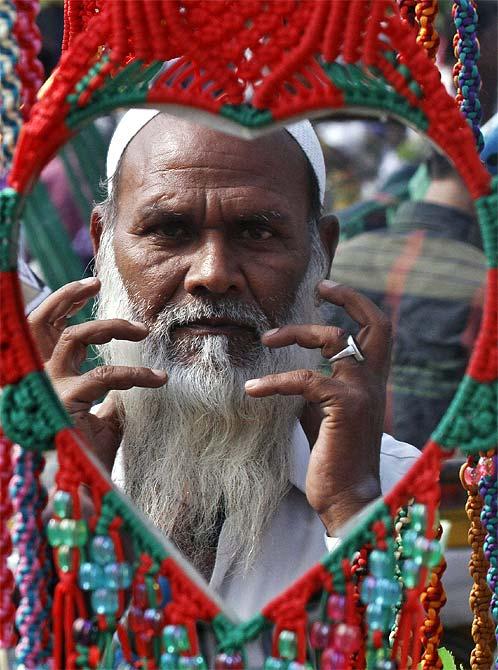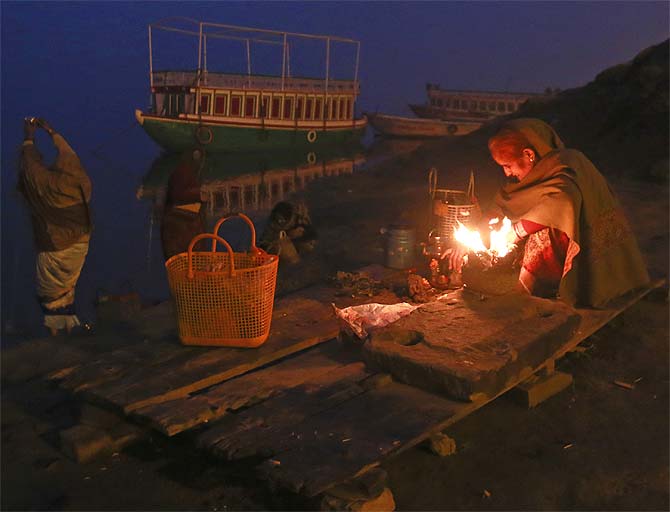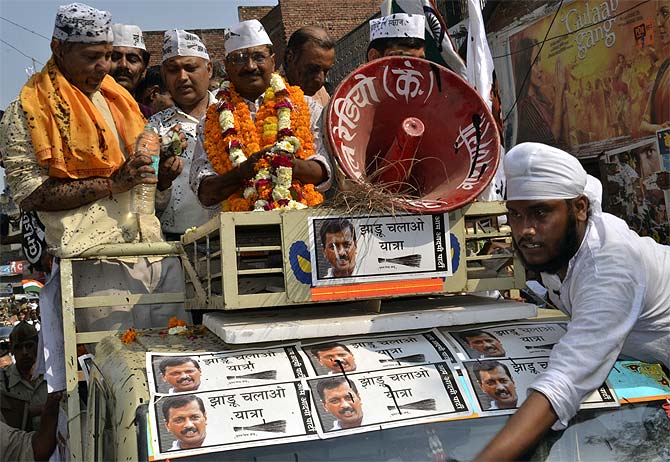
The bleakness of being a Muslim in Uttar Pradesh depresses both its youth and community leaders alike, says Archis Mohan
Siddiqui Hassan, an elderly Varanasi-based social activist, shakes his head in dismay when asked about the party or parties Muslims of Uttar Pradesh might vote for in the coming Lok Sabha elections.
“Do we have much of a choice?” he asks.
Hassan says the problem isn’t who Muslims might vote for.
“Less and less of our youth are interested in engaging with the mainstream,” says Hassan dejectedly, as he sips lemon tea at Pappu tea stall near Assi ghat, Varanasi’s predominantly Hindu locality.
Hassan is the only Muslim in a crowd comprising Varanasi’s elite -- Baniyas, Thakurs and Brahmins; traders, professors, advocates and retired journalists; Marxists, socialists, Kangressis and Bhajpaayis -- who gather in mornings and late evenings at the tea stall to discuss politics.
Hassan, who has had links with all hues of political parties as a social worker -- from communists to the Rashtriya Swayamsevak Sangh’s Muslim Rashtriya Manch -- admits to being a rarity within his community, as he continues to engage with Hindus.
He cites his community’s insularity and an end of engagement between young Hindus and Muslims as the real reason for the fear of the unknown; in this case, of possible tensions similar to those in Western UP’s Muzaffarnagar.
Click on NEXT for more...

The bleakness of being a Muslim in Uttar Pradesh depresses both its youth and community leaders alike.
Kismet Ali Khan, a Varanasi-based businessman in his late 30s, sums it up. He says the Bharatiya Janata Party’s election plank of development is meant to mask its aggressive Hindutva, the Aam Aadmi Party has no base in UP, the Congress (barring some individual candidates who might win) is decimated, the Samajwadi Party failed to protect Muslims in Muzaffarnagar and Mayawati’s Bahujan Samaj Party has been known to hobnob with BJP in the past.
“Muslims in UP are no longer a vote bank for any particular party. We will vote for whoever can defeat BJP candidates,” says Khan, adding Muslim votes in each constituency will be decided barely three days before polling.
Abdullah Ansari, who works among Varanasi’s predominantly Muslim weavers, says the community is likely to return to the tried and tested.
“We may be angry with the SP but what option do we have? Muslims will have to choose between SP and BSP in most of UP.”
There also is a trend of Muslims’ trust in Mayawati’s BSP increasing. This is evident across the state, particularly as her Dalit vote is considered less likely to be swayed -- the efforts of BJP’s prime ministerial candidate Narendra Modi have been to charm the pichhdaa (backward) voters who traditionally vote for Mulayam Singh Yadav’s SP.
Also, the failure of the state’s Akhilesh Yadav government in controlling the Muzaffarnagar riots has somewhat dented Muslims’ confidence in SP, while they remember behenji’s adept handling of law and order after the Allahabad high court’s Ayodhya judgment in 2010.
This has enthused Mayawati to field as many as 19 Muslim candidates.
Click on NEXT for more...

But there also is a growing real fear -- or is it imagined? It’s difficult to say -- among Muslims of eastern Uttar Pradesh of a possible repeat of Muzaffarnagar-like riots.
They are convinced that BJP will hold sway in the 25 western UP seats because of communal polarisation.
Eastern UP’s 30-odd seats, though, have proved a weak spot for the BJP. And, much of the party’s chances of bagging half the state’s 80 seats will hinge on its performance in this region.
BJP workers across the state have taken to talking of a pashchimi bayar (western wind) in favour of Modi. The wind will start from Muzaffarnagar, which goes to polls along with neighbouring seats on April 10, and sweep the entire state as it gradually moves to Varanasi and parts of eastern UP that vote a month later on May 12, they say.
Muslim community leaders are convinced that the real reason for fielding Modi from Varanasi is introducing an undercurrent of aggressive Hindutva, which might help the BJP break the caste and Muslim alliances of SP and BSP.
Mulayam’s decision to contest from Azamgarh, not far from Varanasi, has somewhat negated that advantage and might help SP recover some of its lost ground among Muslims.
In 2009 elections, tactical voting by Muslims, poor presence of BJP on the ground, and caste alliances remaining intact meant that BJP won only 10 seats, with 18 per cent votes, while the Congress bagged 21 seats with its vote share almost equal to the saffron party’s.
The state gave 70 of its 80 seats to non-BJP parties.
Muslims comprise over 20 per cent of the electorate in more than two dozen western UP seats.
In eastern UP, their vote is crucial in 12 seats, including Azamgarh, Bahraich, Gonda, Sravasti, Varanasi, Domariyaganj, Gonda and Balrampur.
Click on NEXT for more...
Click on MORE to see another PHOTO feature...